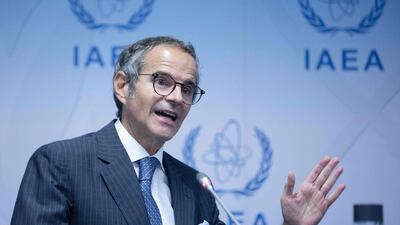The UN has criticised Iran's move to bar about a third of the international nuclear watchdog's most experienced inspectors assigned to the country.
Iran's move is a response to calls from the International Atomic Energy Agency's Board of Governors this week for Tehran to co-operate immediately on issues including explaining uranium traces found at undeclared sites.
“I strongly condemn this disproportionate and unprecedented unilateral measure which affects the normal planning and conduct of Agency verification activities in Iran”, said Rafael Grossi, head of the IAEA.
Mr Grossi said that, while the move was permitted under the NPT Safeguards Agreement, it “openly contradicts the co-operation that should exist between the agency and Iran”.
“Without effective co-operation, confidence and trust will continue to be elusive and the agency will not be in a position to discharge effectively its verification mandate in Iran”, he added.
He called upon the Iranian government to reconsider its decision and to return to a path of co-operation with the IAEA at the “earliest opportunity”.
“This profoundly regrettable decision by Iran is another step in the wrong direction and constitutes an unnecessary blow to an already strained relationship between the IAEA and Iran,” he said.
Iran later responded to Mr Grossi's comments, saying it had a right to block the inspections, based on a previous agreement with the IAEA.
“Unfortunately, despite Iran's positive, constructive and continuous interaction with the agency, the three European countries and the United States abused the [IAEA's] Board of Governors for their own political purposes,” Foreign Ministry spokesman Nasser Kanaani said.
Iran's state-linked Irna news outlet said “Iran had taken the measure based on the governance rights given to the country in Article 9 of the text of an agreement between the country and the agency for the application of safeguards in connection with the Treaty on the Non-Proliferation of Nuclear Weapons”.
Last week, the IAEA said in confidential reports that Iran had made “no progress” on several outstanding nuclear issues.
These include reinstalling IAEA monitoring cameras that Tehran had removed from its nuclear sites, or explaining the presence of man-made uranium particles found in Iran.
Mr Grossi also this month said hopes of a breakthrough after he visited Tehran in March have not materialised and could not “provide assurance that Iran's nuclear programme is exclusively peaceful”.
Iran has separately flouted its commitments under the 2015 nuclear deal with world powers, which the US abandoned under Donald Trump's presidency.
Talks on reviving the pact have been in limbo for more than a year. Western powers say Iran has no credible reason under a civilian programme to enrich uranium to 60 per cent, well above the deal's 3.67 per cent limit.
Most experts agree uranium must be enriched to around 90 per cent purity to make an atomic bomb, although some argue it is still possible at lower levels. Once uranium is enriched to 60 per cent, analysts say it is not technically challenging to then reach 90 per cent purity.


